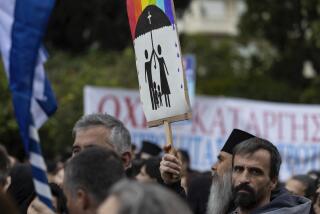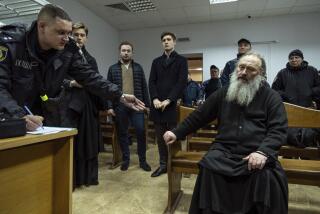Churches in Russia Reopen Dialogue
- Share via
MOSCOW — A bitter rift that emerged this year between Russia’s Orthodox and Roman Catholic churches could be easing, as senior clerics on each side have released letters outlining their positions but appealing for a repair of the breach.
The frank exchange appeared to be the beginning of a formal dialogue on the issues that have been dividing the two churches, after months of recrimination since the Vatican announced in February that it was establishing formal dioceses in Russia.
The tensions have contributed to the Russian Orthodox Church’s resistance to Pope John Paul II’s long-held wish to visit this nation before the end of his papacy. They also are believed to be behind the government’s revocation of the visas of several foreign Catholic clerics, which has led to charges that Russia is not abiding by guarantees of freedom of religion.
In the Orthodox Church letter, the patriarchate’s external relations department refers to a “serious wound” caused by Catholic “proselytizing” in Russia and by the Vatican’s decision to create four Catholic dioceses on Russian territory and several new ones in neighboring Ukraine, another former Soviet republic.
The letter, written by Archpriest Vsevolod Chaplin, said the creation of the dioceses indicated that the Catholic Church is retreating from its past commitments to regard the Russian Orthodox as a “sister church” and instead is competing against it for souls.
“The wound is serious, and the question arises: Are those who inflicted this wound capable of healing it?” the letter asked.
In a response, made public this week, Catholic Archbishop Tadeusz Kondrusiewicz made clear that he recognized the Orthodox Church as the leading Christian denomination in Russia.
“We are not trying to make Russia a Catholic country,” he insisted.
“The Russian Orthodox Church has the basic mission of the spiritual rebirth of Russia after three generations of a militantly atheistic regime, and we hope to have fruitful cooperation with her.”
But he said Catholics have lived in Russia for centuries and cannot be relegated to a “sealed milieu” or an “ethnic ghetto,” and the church must have the right to preach and tend to the needs of Catholics, have normal church structures and monastic life, carry out charitable activities and train Russian clergy “according to their free choice.”
The eight-page Orthodox document accused the Catholics of behaving as though the churches were two companies fighting over market share. It said the Catholics seem to have come to Russia to take advantage of the deep native faith at a time when seminaries are closing and churches are being abandoned in Western Europe.
The thrust of the Orthodox allegation has been that Catholics are seeking to convert Russians, rather than supporting the Orthodox Church’s own programs.
“Love and concern for the neighbor are fundamental notions in Christian teaching. But if the Catholic Church wants to work in Russia as if it were in a kind of vacuum, ignoring the opinion and interests of the Orthodox, what does it imply for partnership and dialogue?” Vsevolod wrote.
Kondrusiewicz in his letter denied that was the case. “We are not competing in a ‘religious market,’ ” he said, “and completely concur with the words that if we were to compete in a ‘religious market’ it would harm both Orthodox and Catholics.”
The Catholic prelate acknowledged that his church has received some recent Russian converts, but said it was not through active enticement by priests and nuns.
“Many come to us with the words, ‘Our parents were Catholics, but for want of a Catholic church, we were christened as Orthodox. Now we want to return to our own church,’ ” he said. “Such a deliberate change of allegiance cannot be called an act of proselytism.”
There are an estimated 500,000 to 600,000 Catholics in Russia, most of them ethnic Germans, Poles or Lithuanians who were historically linked to the Rome-based church.
More to Read
Sign up for Essential California
The most important California stories and recommendations in your inbox every morning.
You may occasionally receive promotional content from the Los Angeles Times.













